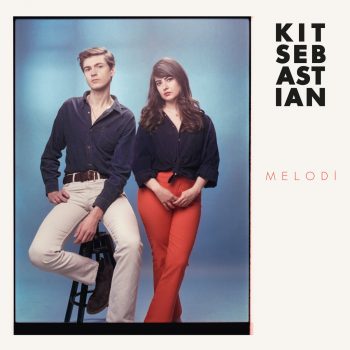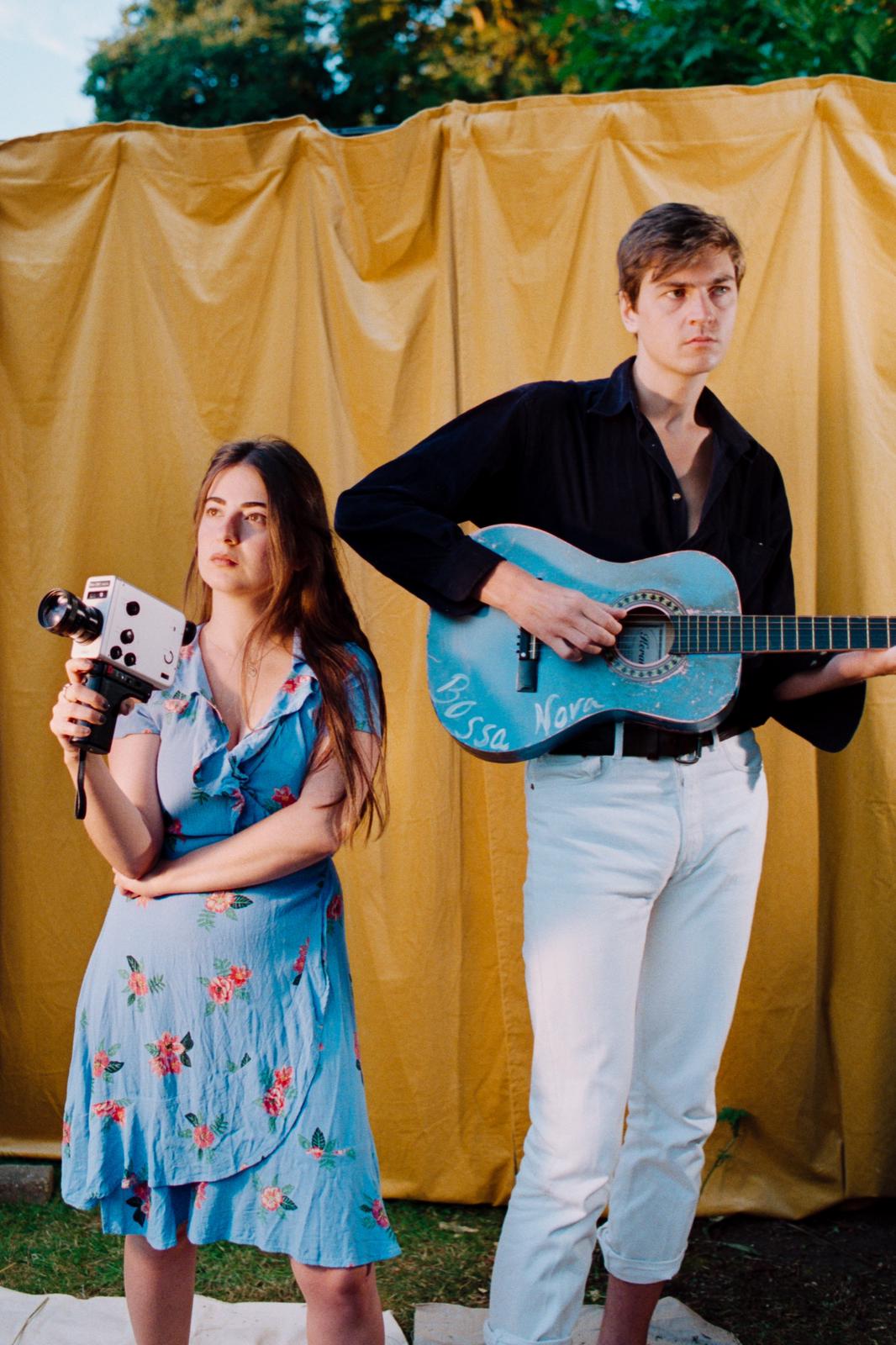Kit Sebastian’s ‘Melodi’ is a solid cinematic sequel, but can everybody just stop calling music cinematic for one second? Please?
Stream: ‘Melodi’ – Kit Sebastian
I enjoyed quite a few parts of this record, in fact, I like most of it. But I have a bone to pick. Neither Kit Martin nor Merve Erdem did anything wrong; the Melodi press release doesn’t even mention the word cinematic, thankfully. But that’s no excuse for the handfuls of pressers that did.

Much has changed since Kit Sebastian’s first record; and while I might have marveled at the sound of soundtracking music on this duo’s first record, Mantra Moderne, many contemporary composers have come along with their own brand of cinema to the point of word vomit. It’s not the artist’s fault for developing more than one skill, either. The Kit Sebastian duo are, first and foremost, cinema students. It’s just the endless emails from representatives touting the next best thing in multidisciplinary music. Well, I’m going to knock this cinematic music shit off right here, right now by asking the simple question: “what makes music cinematic?”
This rabbit hole goes deeper than one might expect, you could consider the Beatles’ Rubber Soul to be a cinematic album if you wanted to. But these parameters can be tweaked: for the fan of musical theater, Gordon Jenkins delivered the spiritual successor to the concept album in 1946 with Manhattan Tower, an album musical. Before that, one would have to consider film scores. Even more abstractly, the first nickelodeon rags of silent cinema before Al Jolson asked American audiences all over “…wait a minute” during the roar of the late Twenties.
Still, the concept can run wider: what is Tchaivosky’s 1812 Overture if not the musical picture of Napoleonic artillery, lock, stock, and barrel? What is Peter and the Wolf if not a Profokiev picture delivered in oboe themes and violin motifs? What is the difference between the tales of a traveling troubadour or griot and Robert Johnson, hollering himself prostrate down at the crossroads? Music can summon images, in fact, that’s what good music does best of all. Yet these questions were no less pertinent in 2019 than they are now when it comes to understanding what makes cinematic music, er, cinematic. The difference was my failure to ask them.

Kit Sebastian’s Mantra Moderne just had that magnetic artistic allure; a debut defining Kit Sebastian as a band that should sound like emotions and scenes, not other bands. Melodi works as a smattering of picturesque jazz ideas developed away from their Anatolian roots and excised of any garage psychedelia. The majority of this record mimics the improvisation of a Latin percussion section or the lo-fi funk of a post-Motown era. Far be it for our leads to belt out in a vocal harmony, Martin plays with a swaggering Superfly rhythmic chop and wah, ululating the guitar as needed.
With Martin playing both dervish guitars and the piecing cabaret piano between them, “Yalvarma” features a rhythm guitar that tackles its melody like a Blaxploitation film. The lead guitar plays off its rhythmic counterpart with a sonic profile that is once tinny and yet full of tone as if recorded in mono and then converted into stereo. Erdem’s lyrics revolve around the eponymous, forward-looking refrain, “Yalvarma,” which translates to “don’t beg.”
“Kendin kandirma sen/ sözlerinin içi boş” she sings; “Don’t fool yourself/ your words are empty.” Her words quake. The warbling melodies weak you at the hip with a belly dancing shake. As far as opening tracks go, Martin and Erdem could hardly pick a more suitable candidate. Lyrically, Erdem grapples with her identity as a Turkish national abroad and the crushing depression of the expatriate: to represent her country better than the country itself. But listeners wouldn’t realize there was an actual tension here without reading the lyrics or watching the music video.
“Forgive me, my darling/ My love was brief/ Awake at your side/ Your world felt cramped” could very well be words between paramours on “Affet Beni.” But the succeeding “Inertia” does give one a sense that all of these pet names and euphemisms could be proxies for Erdem’s relationship with her native country; “inertia fills the culture I must breath/ to feel connection to disease.” Some of Erdem’s sentiments veer into the frustratingly vague. Her aptitude for obfuscation of the utmost degree bests her poetic sense on a great majority of this record. “Melodi Pt 2” features flimsy poetry; “Dreams are a light in the night’s blaze,” and “sounds fade away into the depths of sleep” read the laughable lines of a cut-rate mystic.
Watch: “Agitate” – Kit Sebastian
“Laughter, distances, coincidences,/ Sedatives, narcotics, empty cries, insatiable curiosities/ The concreteness of existence is mimetic to a body without organs,” Erdem showcases a non-sequitur on “Ahenk.” And even if this album speaks from the Turkish mind’s eye, it thoroughly departs from Anatolia. Not a quiver of the bağlama can be found on this record. It’s mostly just piano, brass, guitar, and some chimes over a soft percussion. For more peregrine and particular string instrument choices, Kit Martin turns to the balalaika, zither, and harpsichord. Only two tracks feature an oud in a supporting role. Removing almost all the Anatolian sensibility from their instrumental axis and means the records writ large retreat to sounds that are not unique.
The effect most pronounces itself on Side Two; it’s no stretch to say “Inertia” sounds similar to a number of Thomas Brenneck compositions. Even, “Elegy for Love,” one of the album’s better tracks suffers. With a dynamic mix featuring a glockenspiel twinkle and Munéyuki Sugiyama’s distorted trumpet klaxon, Erdem’s deadpan delivery, and Ellie Wang’s viola, the cut strikes more as a Burt Bacharach score for French spy television. It’s just been written to Kit Sebastian’s sensibilities. Hell, “Agitate” is a harpsichord and horns track that could have just as well been a b-side to any number of John Barry’s compositions for From Russia With Love or Marvin Gaye scores for Trouble Man. Once again, the composition exudes a neo-noir effect perfect for Eric Rochant’s Le Bureau des Légendes. Even further, “Please Don’t Take This Badly” bops along like a Gilberto/Getz supermarket cut with a Caribbean percussion flair. It would nestle quite comfortably in the Cuban milieu of the Godfather Part II, were Martin and Erdem born at the right time. Instead, they are here, making music for films that have already been ensconced in national libraries.
One last point: for the pedants out there—of which, I am one—there is an important distinction between cinematic and concept albums. Pink Floyd’s The Wall can work entirely without any film (it works better, in fact). The Who’s Tommy spares no expense to present its story of a Pinball Wizard in stereophonic sorcery. But there’s become a sizable number of PR today suffering on the multidisciplinary high of artistic work made for some audiovisual experience that amounts to little more than a semi-inebriating music video. Such that it detracts, in my mind, from the actual process of making music for music.

It’s a view sculpted by Pearl Jam’s Jeffrey Ament plain stating: “I don’t want people to remember our songs as videos” in the aftermath of the band’s controversial single and even more visceral video for “Jeremy.” But it’s also a question invoked by an endless stream of press releases also using that same four-syllable simulacrum.
Every time I read cinematic on a press release I want to scream out: “get over it!” And yet still, in critiquing Melodi, one can’t help but buy into the nonsense. All the tracks certainly do the job to conjure the feelings and sensations of film measured by the millimeter and delivered by the roll, each recalls the warmth of classic cinema. The references just creep in without even trying. I speculate that the same thing happened as Martin and Erdem wrote, tracked, demoed, and refined this record. Melodi features smart and efficient world jazz from around the globe.
Kit Martin’s abilities as a style collecting producer have only expanded. Merve Erdem’s aptitude with English became more evocative and full of form. As a pairing, I do not want them to stop after one so-so record. But much in the same way psychedelic music doesn’t exist but for good music (and Kit Sebastian’s debut definitely qualifies for good music), cinematic music should only exist as good music as well. Whether someone makes cinema from a capital record is something no press release should force.
In fact, I’d appreciate it if all press releases just stopped using that word to transform the music they represent into a smattering of kitsch. Maybe then I could enjoy more of the music sent my way.
— —
:: stream/purchase Melodi here ::
— — — —

Connect to Kit Sebastian on
Facebook, Twitter, Instagram
Discover new music on Atwood Magazine
? © Muneyuki Sugiyama
Melodi
an album by Kit Sebastian









